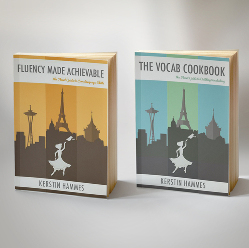Hi! I'm Vanessa from speakenglishwithvanessa.com.
Huh? What'd you say? Let's talk about it.
Have you ever been watching your favorite movie or TV show and decided to turn it to English and then, oh my goodness, it's so fast! How in the world are they talking so fast. I can't understand this.
Well don't worry, you are not alone. Many English learners have had that same sensation of 'Ugh it's so fast, I'll never understand this.'
Well I have some good news. In today's lesson, you are going to learn 5 secrets to understanding fast English, improving your listening skills, and understanding movies and TV shows.
To help you master today's lessons, I've created a free PDF worksheet, just for you, my beloved students! So that you can download this worksheet, study these 5 secrets, check out all of the tips and ideas that are mentioned in today's lessons, and at the end of the PDF, make sure to answer Vanessa's challenge question so you can use what you have learned in this lesson.
Don't forget to click on the link below this video to download the free PDF worksheet.
Alright, let's get started with the first secret:
Problem number 1 - don't watch a movie or TV show that you are unfamiliar with or you only understand 10 percent. Ugh, that's so frustrating. Instead, apply secret number 1:
Watch a movie or TV show that you already know in your native language. You are already familiar with the story, the characters, possibly even some of the words. If you need to use English subtitles, go ahead, but this is a great way to let go of fear, to let go of the frustration, 'I can't understand. It's just, I only understand every couple words, and it's just too much.' No, watch something you already know in your native language.
Have you seen Disney's Frozen in your native language? Great, watch it in English.
Have you seen Forrest Gump in your native language? Excellent, watch it in English. It is a great way to feel more confident and to improve your listening skills, to understand fast English.
Problem number 2 - don't study how individual words are pronounced. Instead follow secret number 2 which will help you to overcome this problem and that is:
Study some common linking expressions in English.
For example, if you ask me,' Vanessa, where are you going?' and I say, 'I'm gonna go to the mountains.' Hm? Okay, maybe you understood a couple parts of this, but do you really understand the linking that is happening so that when other people say this, who are not your English teacher, you can get it.
Let's break down this sentence:
I'm unna go-da the mountains. 'I'm unna.' Well, I'm really saying 'I am going to.' First I'm using a contraction: I am becomes I'm. And then, I'm pushing together, or linking together, going to, which often becomes 'gonna.'
I'm gonna take a nap.
I'm gonna study English.
But - we can reduce it even further and cut off the 'G' and say 'I'm unna,' which is what I said earlier. 'I'm unna, I'm unna.' If you're listening for 'I am going to,' you will not get this. But, if you understand some common linking principles in English, contractions, going to becomes 'gunna,' or becomes 'unna,' your ears will be more aware of it.
Let's go to the last part of that sentence: 'I'm unna go-da the mountains.'
'Go-da the mountains.' 'Go-da.' The word 'to' becomes 'da.' This is very common after the verb 'go.' 'Go da the mountains.' I'm unna go da school tomorrow.' 'go da school.'
'I gotta go da the office.' 'Go da the office.' Excellent!
What's happening with that last word? Mount'ins. Mount-ins. Well, often if there is a T plus 'in' sound at the end of a word, we drop the 'T' and kind of swallow that sound. Listen to these other words that are very similar:
Button becomes bu'nn.
Threaten becomes threa'in.
And mountain becomes mount'in.
Now, you can say this word clearly and say 'I'm unna go to the mountains. Mountains.
It's okay.
But you’re gonna hear people say (you’re gonna, I just used that reduction) you’re gonna hear people say mountains and you need to be able to understand it. We’re all focusing on improving your listening skills for comprehension so that you can understand how people are speaking in daily conversations. so with this one very simple sentence you learned some key phrases: “i’m una go-da the moun’ins”. Can you say that with me? Let’s have a little pronunciation practice. Also when you improve your pronunciation, you are also improving your listening, so they are linked together. Let’s say it together. I’m gonna go to the mountains. I’m gonna go to the mountains. Lovely.

WOW! THIS IS LONG!!!